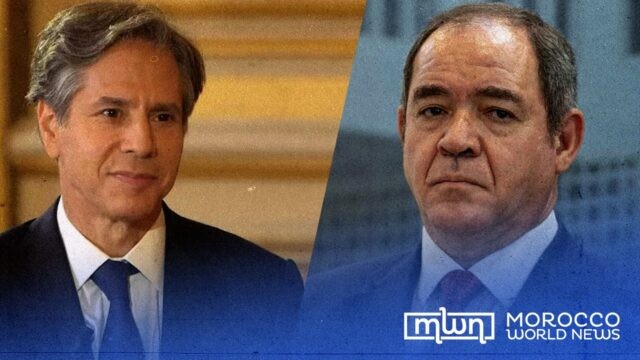
Western Sahara: Algeria Escalates Anti-Moroccan Maneuvers with US
Thursday’s phone conversation between Algerian FM Boukadoum and Secretary Blinken caused concern among observers and political analysts, who urged Morocco to ramp up its lobbying against Algiers’ maneuvers.
The Algerian government is expressing satisfaction regarding the conversation its foreign affairs minister Sabri Boukadoum and US Secretary of State Antony Blinken held on Thursday, April 29.
Boukadoum took to Twitter to announce his talk with Blinken, saying that the two discussed means to strengthen the “strategic partnership” between Algeria and Morocco.
He said the discussion also covered several regional dossiers, including Western Sahara, Mali, and Libya.
Meanwhile, Blinken published a tweet announcing information on the talks between him and Boukadoum.
“We discussed our desire to see stability and prosperity in Libya and the Sahel, and I was glad to extend wishes for a happy holy month,” Blinken said.
The Department of State issued a press release regarding the talks, which also did not mention any exchange about Western Sahara.
Political observers and analysts in Morocco expressed concerns regarding the phone call between the two officials.
More lobbying efforts needed from Morocco
Moroccan foreign policy expert and MWN Editor-in-Chief Samir Bennis was among political analysts who said they were “uncomfortably surprised that the call happened first with Algeria.”
The analyst believes that the phone call reflects a thus far lack of smooth communication between Morocco and the new US administration.
“The public relations company that has been working for Algeria for more than three decades has done its work properly,” Samir Bennis wrote, pointing out to the issue of Blinken calling Algeria’s foreign minister before Morocco’s FM.
While not seeing that as a worrying sign and being convinced that Biden will not reverse US recognition of Morocco’s sovereignty over the Sahara, Bennis believes the first call should have happened between Blinken and his Moroccan counterpart, Nasser Bourita.
The analyst said that even though Blinken did not mention Western Sahara in the talks, his mention of Algeria’s role in preserving stability in Africa mirrors the talking points that the lobbying firm that represents Algeria in Washington typically uses.
Bennis fears this step might signal the US’ intent to adopt a “politically correct” position and not bring pressure to bear on the parties, mostly Algeria, in order to reach a mutually acceptable solution based on the Moroccan autonomy plan.
Abdelhamid Benkhattab, a professor of Political Science at the Mohammed V University in Rabat, shared similar concerns in a statement to Morocco World News.
The professor emphasized although there are some worries regarding the call, the US position has not changed regarding Western Sahara.
He said that the Joe Biden administration is taking time to make its position clear regarding Donald Trump’s recognition of Morocco’s sovereignty over Western Sahara.
He stressed that it is standard for the US to tackle its priorities first.
“This is diplomacy,” the political science professor told MWN.
In response to the phone Blinken-Boukadoum call, the professor said that Algeria will now try to play its cards, as it has specific expectations from the new US administration and the UN Security Council.
Both Algeria and Polisario have intensified efforts to convince Biden’s administration to reverse Trump’s Western Sahara recognition.
Even if it was only a simple discussion on the regional dossier, Algeria saw the call as a positive move, allowing it to claim that the two discussed the Western Sahara conflict, in an attempt to publicize its commitment to defend and support Polisario’s independence claims.
The professor is “sure” that the US will not change its position, but believes that Morocco should remain vigilant in the face of Algiers’ maneuvers.
Benkhattab said he had some concerns even before Biden assumed the presidency that his administration would lean toward the left or even the radical wing within the country’s Democratic Party.
He said that in the face of non-friendly moves from radical leftists, which could go against Morocco’s interests, the North African country has many friends with influence on US foreign policy and diplomacy.
He added that Morocco-US cooperation is stronger than such concerns.
Potential Morocco-US discussion
Amid analyses and observations regarding the US-Algeria rapprochement, news outlets in Morocco suggest that Moroccan Minister of Foreign Affairs Nasser Bourita is expected to hold a discussion with Blinken today.
Local outlet Le360 quoted a source saying that Western Sahara will be among the main topics the officials will discuss during their first call.
Both officials are also expected to discuss cooperation against terrorism and the security threats prevailing in Libya and Sahel region.
Morocco is among the countries that have played a role in mediation between rival Libyan parties.
Morocco expressed its continued determination to engage in the UN-led political process to help Libyans find a solution to end the humanitarian crisis in the neighboring country.
The country hosted several roundtables chaired by Libyan parties in Bouznika and Tangier. The meetings yielded several agreements that contributed to the UN-led political process.
Morocco is also a strong ally for international partners in the field of security, mainly counterterrorism.
Source: Morocco World News.
